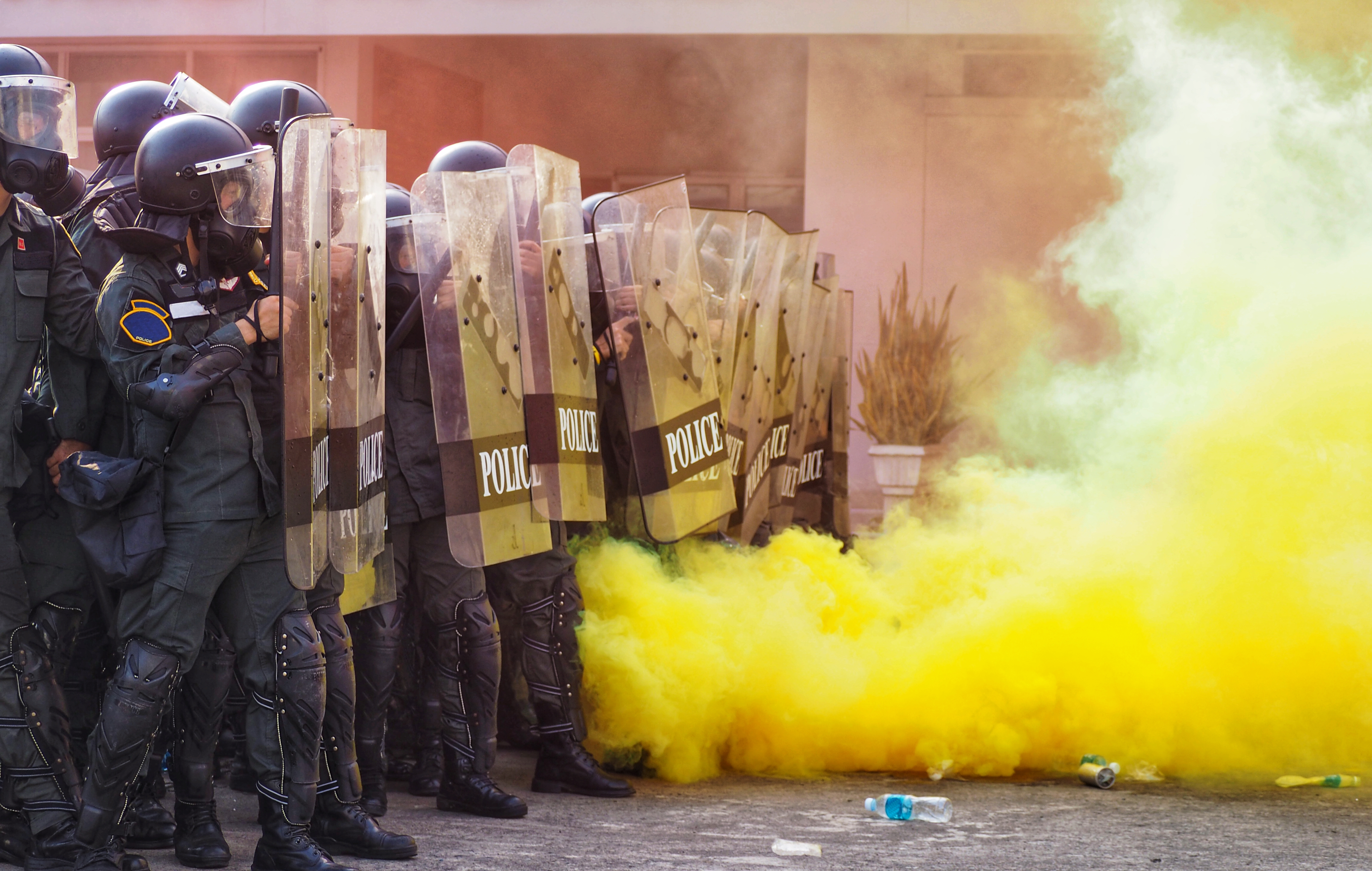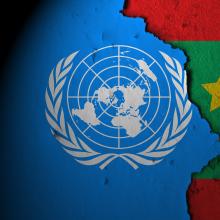May 01, 2025
1. Abstract
Across the Middle East and North Africa (MENA), counter-terrorism laws, measures, and rhetoric are systematically employed to restrict civic space, target human rights defenders, and silence dissent. The fight against terrorism continues to be weaponised to commit widespread abuses, including arbitrary detention, torture, unfair trials, executions, violations of the non-refoulement principle, and genocide. This briefing paper provides an overview of the main, recent trends of counter-terrorism abuse in the MENA region, through the case studies of Saudi Arabia and the UAE in the Gulf, Algeria and Egypt in North Africa, Iraq and Palestine/Israel in the Mashreq. The paper also exposes the regional trend of transnational repression and the role of the Arab Interior Ministers’ Council (AIMC) of the Arab League.
This briefing paper was submitted as a response to a call for input by the Secretary General of the UN to inform his report to the 80th session of the UN General Assembly on the implementation of resolution 78/210 on Terrorism and Human Rights. It focuses on the reporting period (from June 2023 to June 2025).
2. Gulf
In the Gulf, Saudi Arabia and the United Arab Emirates (UAE) persistently use their counter-terrorism framework to target human rights defenders, peaceful protesters, government critics and religious minorities.
2.1 Saudi Arabia
The definition of terrorism contained in Saudi Arabia’s 2017 Law on Combating Crimes of Terrorism and its Financing has been criticised by UN Special Procedures for being overly broad, with ambiguous terms such as “disturbing public order”, “destabilising national security or state stability” and “endangering national unity”, which “could entail that a range of speech and association activities protected under international human rights law is characterized domestically as ‘terrorism’.”
Saudi Arabia’s State Security Apparatus, namely the State Security Presidency (SSP), the Public Prosecution Office (PPO), and the Specialised Criminal Court (SSC), which form the Kingdom’s institutional framework governing counter-terrorism, lacks independence from the executive, and plays a central role in enabling human rights abuses under the guise of countering terrorism.
An emblematic case is that of Manahel al-Otaibi, a 30-year-old fitness instructor and women’s rights activist convicted of “terrorist offences” due to her tweets in support of women’s rights and Snapchat photos of her not wearing a abaya. Detained since 2022, she was forcibly disappeared and subjected to torture. In January 2024, she was sentenced to 11 years in prison for her online advocacy by the SCC, and her sentence was upheld by the SCC of Appeal (SCCA) in November 2024, following a secret trial marred by due process violations. UN Special Procedures raised her case in a communication sent to Saudi authorities, highlighting that her case illustrates Saudi Arabia’s systematic use of its counter-terrorism law and SCC to “restrain and punish the legitimate exercise of rights protected under international human rights law” and “quash criticism, dissent and opposition to the Government and royal family”.
In addition to criminal prosecutions, Saudi authorities impose administrative counter-terrorism measures onto peaceful activists and their families, including travel bans. Defined as “official orders that prevent a particular citizen or group of citizens from entering or leaving the country”, the authorities impose two types travel bans on individuals suspected of or prosecuted for terrorism: “official” travel bans, systematically issued by the SCC for a duration equal to the prison sentence; and “unofficial” travel bans, imposed by the SSP and PPO without any judicial oversight or notification to the concerned individual, “if security interests so require” or “if the investigation so requires”.
The case of Loujain al-Hathloul, a prominent Saudi women’s rights defender who was jailed for campaigning against the driving ban and the male guardianship system, illustrates both types of travel bans. In December 2020, she was sentenced by the SCC to five years and eight months in prison (partially suspended), in addition to a five-year “official” travel ban. Conditionally released in February 2021, her sentence was upheld in March 2021, and she remains under a travel ban in Saudi Arabia to this day.
In addition, since 2018, al-Hathloul’s parents have been under an “unofficial”, open-ended travel ban, discovered only at the airport while they attempted to travel. Despite many inquiries with the authorities, they were never provided any legal documentation or formal explanation. The travel bans have been the cause of the separation of their family for years: while her siblings live abroad, al-Hathloul and her parents remain in Saudi Arabia with no knowledge about the basis or duration of their bans.
Al-Hathloul’s sister Lina, jointly with the relatives of other Saudi nationals subjected to “unofficial” travel bans, including Maryam al-Otaibi, Salman al-Odah, Omar and Sarah al-Jabri and Aoud al-Qarni, addressed a joint letter to the Saudi Human Rights Commission deploring the adverse impact of the bans on their lives and requesting for the circumstances of these measures to be investigated and for the bans to be the lifted. They did not receive a response.
2.2 United Arab Emirates (UAE)
In the UAE, the 2014 Law on Combatting Terrorism Offences contains a vague and overly broad provisions that restrict freedom of speech. UN Special Procedures criticised the law’s definition of terrorism for failing to define the term directly, instead referring to “terrorist purpose” and “terrorist result”, which “essentially remain undefined, as one definition refers or defers to another without clearly providing a concrete and constrained definition of the activities they encompass”.
The UN experts expressed concern that the counter-terrorism law’s ambiguity could allow forms of criticism or dissent to be interpreted and prosecuted as terrorism, seemingly at the subjective discretion of the relevant authorities. In this regard, members of the Emirati State Security Apparatus are the main agents of counter-terrorism-related repression, and are responsible for many human rights abuses committed against human rights defenders, journalists and whistle-blowers.
The 2023 Law on Combatting Discrimination, Hatred and Extremism raises similar concerns, particularly due to its definition of “extremism” and the vague references to “disruption of public order” and “incitement to hate speech.” The law also provides that “freedom of opinion and expression may not be invoked” to justify statement deemed blasphemous or harmful, creating the risk that UAE authorities may abuse the law to restrict and suppress fundamental freedoms protected under international law, under the guise of countering extremism.
Recently, while hosting COP28 in December 2023, the UAE brought terrorism charges against 84 political dissidents and human rights defenders, referred to as the “UAE84”, and sentenced them to harsh prison sentences in the country’s second-largest political mass trial. Many had already been imprisoned following the “UAE94” political mass trial in 2013, in retaliation for forming an independent advocacy group. In July 2024, 53 defendants were sentenced to between 10 years and life in prison, and an Emirati court rejected all appeals filed by their lawyers on 4 March 2025. The decision is final and cannot be further appealed. UN Special Procedures denounced the arbitrary terrorism charges and proceedings brought against the “UAE84” in three communications issued in December 2023, January 2024, and July 2024.
The UAE also employs administrative measures, such as citizenship stripping and the denial of identity documents, to target peaceful government critics and human rights defenders arbitrarily accused of terrorism. Many of the defendants in the “UAE94” and “UAE84” trials, and their family members, have been denied the renewal of their passport or identity documents, or seen their Emirati nationality be revoked without due process, in violation of the Emirati Nationality Law and the UAE’s international obligations. This concerning practice places concerned individuals in situations of – or at serious risk of – statelessness, depriving them of their basic rights and protections and severely impacting their day to day lives.
3. North Africa
In North Africa, Algerian and Egyptian authorities increasingly use counter-terrorism laws and measures to repress activists, human rights defenders and journalists exercising their rights to freedom of expression, association and peaceful assembly.
3.1 Algeria
Algeria’s counter-terrorism legal framework, mainly contained in article 87 bis of the Penal Code, has long garnered widespread criticism for its lack of compliance with international standards. The definition of terrorism, encompassing acts targeting “state security”, “national unity”, and “territorial integrity”, was criticised by the Human Rights Committee as “overly broad and vague” and for “allow[ing] for the prosecution of actions that might constitute exercise of the freedom of expression or peaceful assembly”.
Yet, Algeria has introduced further amendments to the Penal Code in recent years, including in 2021 and 2024. UN experts have warned that these changes expanded the already broad terrorism definition in ways “not likely to meet [the] need for conceptual clarity” and created a “national list of terrorist persons and entities” lacking the possibility of judicial appeal.
Algeria’s abuse of its counter-terrorism framework to crack down on civic space was highlighted by the former Special Rapporteur on the rights to freedom of peaceful assembly and of association and the Special Rapporteur on human rights defenders, following their respective visits to Algeria in late 2023.
A notable case is that of Mohamed Tadjadit, a renowned poet and leading figure of the Hirak movement, who has been subjected to judicial harassment since 2019 in reprisal for his peaceful dissent. In January 2024, Tadjadit was investigated for “glorification of terrorism” and “using communication technologies to support the actions and activities of terrorist organisations”, based on private Messenger conversations he had with members of Rachad, later classified as a terrorist organisation following the above-mentioned amended Penal Code.
According to exiled activist Zakaria Hannache, 220 people are currently imprisoned in Algeria for exercising their fundamental rights, many of whom are falsely accused of terrorism.
3.2 Egypt
Egypt’s 2015 Anti-Terrorism Law and Terrorist Entities Law impose harsh penalties and contain overly vague definitions, which have been broadened further through successive amendments. The Human Rights Committee criticised the use of excessively broad and vague definitions of terrorism such as “harming national unity” and “disturbing public order”, and UN Special Procedures found that the counter-terrorism provisions “go beyond the scope necessary to counter-terrorism and severely limit civic space and the exercise of fundamental freedoms in Egypt.”
The Human Rights Committee raised concerns about extended detention without charges in terrorism cases, and the absence of fair trial safeguards. UN experts also raised concerns over Egypt’s “use of repeated and similar national security and counter-terrorism related charges against human rights defenders in detention”.
Among the most prominent imprisoned human rights defenders is British-Egyptian activist Alaa Abdelfattah. Detained on terrorism or national security charges for most of the last 14 years, he should have been released in September 2024, but Egyptian authorities have kept him imprisoned, and reportedly told his lawyer that he won’t reunite with his family until 2027. UN experts called for his release in February 2025 and urged Egypt to “cease the misuse of counter-terror laws”.
In January 2025, the Special Rapporteur on human rights defenders denounced Egypt’s routine abuse of counter-terrorism legislation and recycling criminal charges against human rights defenders, highlighting the “continued detention of human rights defenders past their release date by repeatedly charging them with similar, if not identical, terrorism-related accusations, in a practice commonly known as ‘rotation’ or ‘recycling’”. UN experts have warned that this practice is used to “indefinitely extend the detention of dissenting voices, journalists, human rights defenders and political opponents”.
The Human Rights Committee also expressed concern over Egyptian authorities’ use of administrative counter-terrorism measures, including the listing of human rights defenders, activists, and political dissidents as terrorists without due process; as well as the imposition of lengthy travel bans, asset freezes, and dismissals from public employment.
Another prominent case is Hoda Abdel Moneim, a woman human rights defender who was arrested during a crackdown on human rights lawyers and activists in 2018. While her sentence ended in November 2023, Abdel Moneim was detained again under new terrorism-related charges, with a third set of charges brought against her in 2024. She currently faces two new trials, and was also put on the list of terrorists, which places her under a travel ban and subjects her to an asset freeze. Despite five communications by UN Special Procedures on her case, she remains in detention.
3. Mashreq
In the Mashreq, Iraq has committed grave human rights abuses against individuals arbitrarily accused of terrorism under its counter-terrorism framework, and Israel continues to commit a genocide on Palestinians in Gaza under the pretext of fighting terrorism.
4.1 Iraq
In Iraq, both the Iraqi Federal Government’s 2005 Anti-Terrorism Law and the Kurdistan Regional Government (KRG)’s 2006 Law on Combating Terrorism contain overly broad and vague definitions of terrorism, which fail to comply with the principle of legality. Both laws impose mandatory death sentences for crimes that do not meet the threshold of the most serious crimes. While Iraqi authorities have asserted that there is an ongoing revision of the Anti-Terrorism Law, it continues to be applied. Following a country visit of 2018, the former Special Rapporteur on extrajudicial, summary or arbitrary executions found that “the Criminal Procedure Code appears to be set aside for those charged under the Anti-Terrorism Law, thereby denying defendants their fair trial rights and due process guarantees .
In practice, terrorism suspects are subjected to arbitrary arrests and detention, torture, and unfair trials leading to death sentences and sometimes executions.
Recently, secret, mass summary executions of detainees are perpetrated in Nasiriyah Central Prison, following flawed terrorism trials. After a three-year hiatus following the execution of 21 men in November 2020, Iraqi authorities executed 13 men in December 2023, and have since dramatically increased the scale pace of summary executions. Hundreds have reportedly been executed in secret, and thousands face imminent execution. The executions occur unannounced, without prior notice to detainees’ families or lawyers. UN Special Procedures have warned that they may amount to crimes against humanity.
In January 2025, Iraq adopted new amendments to its Amnesty Law, which “broadens the terrorist offences excluded from amnesty”, and which could “result in an increase in the number of executions carried out by Iraq”, according to UN Special Procedures.
4.2 Israel/Palestine
In Palestine, the rhetoric of the fight against terrorism has systematically been weaponised by Israel to commit human rights abuses against Palestinians. Since October 2023, Israeli authorities have used the pretext of countering terrorism to commit a genocide in Gaza, resulting in over 50,000 people killed, over 100,000 injured, at least 10,000 people buried under the rubble, and 90% of the population forcibly displaced. Israel has also used terrorism accusations to ban UNRWA, Gaza’s main aid agency, despite the catastrophic humanitarian impact for Palestinians and violations of its international obligations.
In this context, Israeli authorities have increasingly used counter-terrorism and security laws, including the Unlawful Combatants Law, to arbitrarily detained and forcibly disappear thousands of Palestinians. This law allows the Israeli authorities to arrest Palestinian residents of Gaza, including on suspicions of engaging in hostilities against Israel, belonging to a terrorist organisation or posing a threat to state security, to try them before Israeli civil courts, and to detain them without charges and for indefinitely renewable periods, based on undisclosed evidence.
UN Special Procedures have repeatedly raised concerns about the Unlawful Combatants Law’s lack of compliance with international standards, including in November 2023, May 2024, and following a country visit in November 2007.
According to data gathered by B’tselem, as of 31 December 2024, the number of Palestinians held by the Israeli prison Service (IPS) under the Unlawful Combatants Law was 1,881, all since October 2023. In April 2025, the Public Committee Against Torture in Israel and Hamoked reported that around 6,800 Palestinians are detained by Israel outside the regular criminal justice process, and approximately 3,436 were captured in Gaza and are held as “unlawful combatants”.
Among them is Dr. Hussam Abu Safiya, one of the most prominent Palestinian doctors in Gaza and director of Kamal Adwan Hospital. Arrested in the context of a major operation launched by Israeli military forces against the hospital in December 2024, Dr Abu Safiya was detained, forcibly disappeared, and subjected to torture. His detention was extended for another six months in March 2025, and he currently remains detained without charges, under Israel’s Unlawful Combatants Law. The Special Rapporteur on Palestine addressed a communication on his case to the Israeli government, but received no response. As reported by the Special Rapporteur as well as human rights organisations, Israel’s targeted attacks on medical facilities and health care workers contributes to the decimation and collapse of Gaza’s healthcare system, which is a component of Israel’s genocide on Gaza.
UN experts have continued to urge Israel and its allies to end the genocide.
5. Transnational repression
5.1 The Arab Interior Ministers’ Council
At the regional level, the systems of the Arab Interior Ministers’ Council (AIMC), a body of the Arab League that can circulate state-requested arrest warrants among Arab League countries while leaving impacted individuals unable to challenge the extradition request, are increasingly used to target exiled dissidents and human rights defenders through politically motivated extraditions, including on the basis of arbitrary terrorism accusations.
The legal framework of the AIMC can notably be found in the 1983 Riyad Arab Agreement for Judicial Cooperation and the 1998 Arab Convention for the Suppression of Terrorism, both of which prohibit extraditions on political grounds but contain broad exceptions, such as for lèse-majesté or undefined terrorist offenses. These legal loopholes fail to meet international standards and permit the extradition of individuals for exercising their fundamental rights protected by international law.
In practice, Arab League states often request the extradition of individuals for criticising the authorities or for participating in peaceful protests, acts which fall under the fundamental rights to freedom of expression and assembly.
MENA Rights Group has documented multiple cases of peaceful activists facing extradition from one Arab League country to another despite the high risk of facing torture in the requesting state, in violation of the principles of non-refoulement and non-discrimination.
Between 2022 and 2025, MENA Rights Group has documented and filed seven individual cases of transnational repression enabled by the AIMC to UN human rights protection mechanisms. Requested and requesting countries included Egypt, Morocco, Saudi Arabia, Jordan and the UAE. Five of them were extradited and have since been arbitrarily detained or forcibly disappeared in the country which requested their extradition, and two were released and are living in exile. All cases involved peaceful dissidents, protestors or religious minorities facing extradition to Arab League countries where they risked grave human rights abuses.
UN Special Procedures have highlighted the human rights concerns posed by the AIMC’s operations, and the issue was identified as a key regional issue by the former Special Rapporteur on counter-terrorism and human rights. Nonetheless, international bodies including the UNOCT, the UNCCT, the CTED, UNODC, Frontex, and INTERPOL continue to collaborate with the AIMC, disregarding concerns raised by civil society.
6. Conclusion
In conclusion, and in light of the above-mentioned considerations, counter-terrorism laws, measures, and rhetoric across the MENA region have been employed to silence dissent, restrict civic space, and target human rights defenders. The fight against terrorism continues to be weaponised to commit widespread abuses, including arbitrary detention, torture, unfair trials, executions, and genocide.
Despite years of documentation by civil society and UN human rights bodies, counter-terrorism abuse persists in a climate of impunity. State practices remain unchanged, abusive counter-terrorism practices are escalating, and international bodies continue to cooperate with government actors that systematically violate human rights under the guise of countering terrorism.
It is imperative for the UN system and the international community to critically reassess whether the global fight against terrorism, as shaped since 9/11, has delivered on its promise, or whether it has instead legitimised repression and caused irreparable harm. The time has come to reconsider not just how counter-terrorism is implemented, but whether it can continue to exist in its current form at all.







